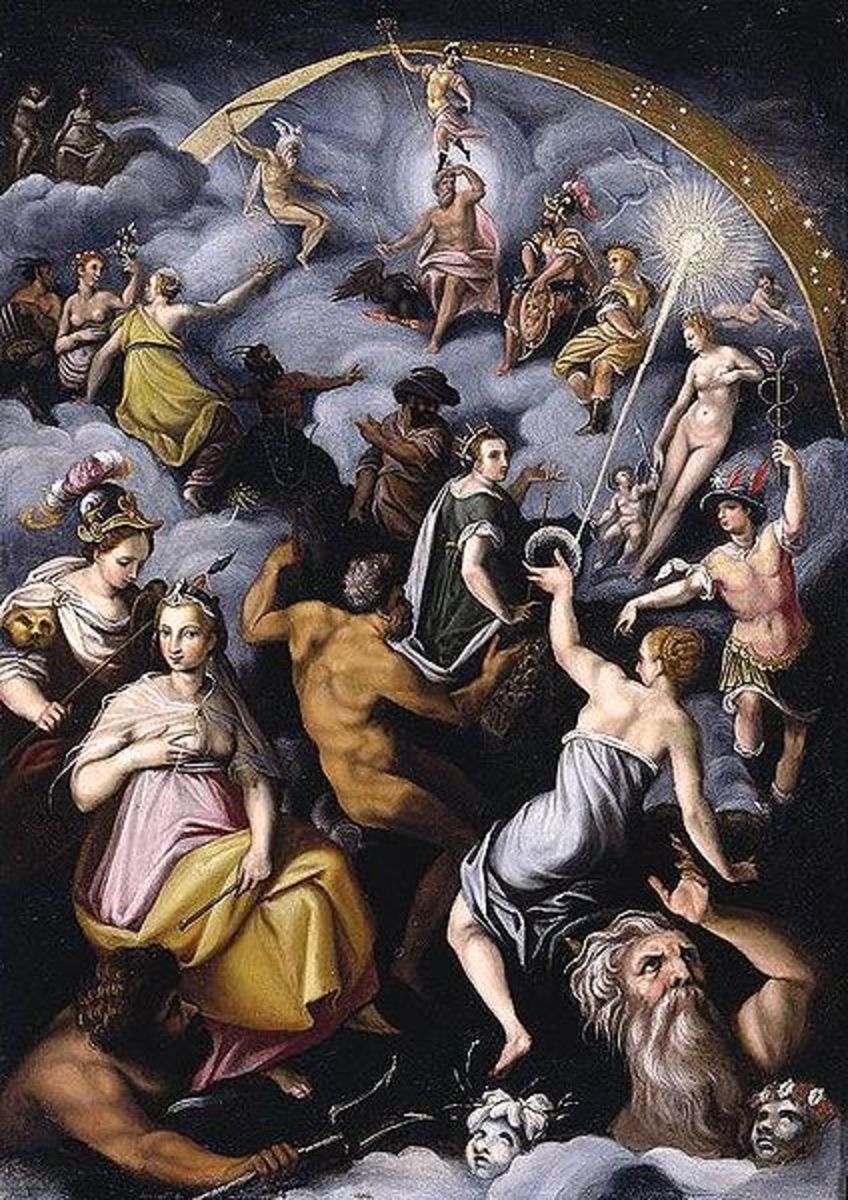Nature of Reality, Will the Real YHWH Please Step Forward, 12) About Zeus, the Greek Ultimate Being
His name is NOT Zeus!





About Zeus
Throughout this series I use YHWH only to be specific about whom I am talking about, and God (capital G) for the true God, "god" for other ideas that aren't real.
As before, Zeus or “Plato’s god” is a placeholder representing Greek speculative philosophers speculation about the ultimate being.
You likely understand that there are two different species, genus, or families of Greek gods. You remember the Olympian gods that had all too human attributes, but superhuman powers in some form.
This is not unusual, you can see this in other cultures, Roman, Norse, etc.
So why do we tend to think of gods in this super human manner?
Well, we are made in the Image of God, according to our premise for this series: the Bible is true. So, if we just had more power, one heck of a lot more power, which is what everyone wants, we would be like those made up gods of Greek, Norse, and Roman mythology, would we not?
Why do we continually strive for power in groups we get into? We act like little gods who want to control everything. Mythology is simply an extension of what we think about ourselves, we have little god complexes for a reason.
Greek Speculative Philosophers
Note the adjective "speculative and thing about that. Is that how we come to understand a transient being, just guessing, speculating what he might be like? Do we come to real knowledge by speculation? Do you have any examples of someone who has done this?
We all know people who, without any direct evidence, speculate about other people. This doesn't normally produce any useful information.
The speculative philosophers did not like this linkage to humanity and so each had his own take on the gods being unlike humans, removed from everything we could possible think about humans, and, if it could be identified as a human attribute, it must not be true of the gods.
So they flipped the idea on its head, the gods were decidedly unlike humans.
Before getting into this it might have been useful for them to check out the God of the Hebrews, YHWH who claimed that, though he was distinctly different, or, other, from the universe, he made man in his image, and thus the similarities between YHWH and mankind. They decided this wasn’t the case, that is why they are called speculative philosophers, they use speculation, conjecture, and assumption, and, if it fit their preconceived notion, and decided the gods are unlike humans, that is their worldview, then they accepted it, then started to speculate what this meant.
(Before you criticize this too much, modern science has been doing this for 160 years. If it fits our model, then it is accepted, if not, not.)
Not that I think the Olympian gods were in any manner real, even they understood they were myth, but some of the characteristics they had were similar to YHWH because they were based on elevated man.
If I reflect YHWH like a poor mirror reflects my image, then another poor mirror can be counted on to reflect another poorer more imperfect image, can it not?
So starting with flawed Olympian gods, they flipped the concept and speculated (guessed) what the gods were like using a different flawed criterion, the unlikeness to man.
This was their fundamental presupposition, their worldview.
The Olympians
The first guess by the Greeks produced lots of gods.
The Greek royal Olympian family starts with Chronos was the leader of the Titans and father of the Olympians, Chronos ate all his children except for Zeus, but this didn’t end well for Chronos. Zeus became the king of the gods, Zeus killed Chronos his father.
Zeus is also the god of thunder. We use him herein for convenience as the ultimate being of the speculative philosophers because they merged the two very different concepts (Olympian gods where were like humans with the ultimate being of the speculative philosophers who was very unlike humans) in order to gain popularity and do away with the other Olympians by elevating everyone’s favorite, Zeus.
Hestia was a little-known goddess, a sister of Zeus and goddess of the hearth. Apparently Chronos missed her while eating the others. Hera was the wife of Zeus, the goddess of fertility. Athena sprang full-grown from Zeus's head. She is the Goddess of wisdom. The city of Athens is named for her.
Poseidon was the god of the sea, Hades, the god of the underworld, very much where we get the current western model of hell. The Bible does not paint such a model, this is one of many influences on our thinking that are extra-Biblical. Demeter Goddess of the harvest and mother of Persephone.
Persephone was the daughter of Demeter. Persephone was kidnapped by Hades to be his bride. Because she ate three pomegranate seeds, she is forced to spend three months of the year in Hades. This period of time is known as winter.
Apollo was god of the sun, music, and art, and one of the most versatile of the Olympian gods, you make of him whatever you wished. Artemis was goddess of the hunt, moon, and childbirth. The sister of Apollo, she is also a very versatile Olympian.
Aphrodite was the goddess of love and the mother of Eros, known to the Romans as Cupid, the god of love. Often depicted as a young child, Eros used magical arrows could to cause people to fall in love. Not the kind of love you imagine, i.e. sexual, rather, actually loving the whole person, and, as it ought to be, physical love comes later to Eros, if at all.
Eros love is more like a eunuch who truly loves his charge and will die to protect her but cannot make love to her, he is a eunuch. Less like college kids of today who think sex is merely something you do without consequence, only to learn later there were wrong.
Ares was the god of war. Haephestos the god of the forge who was thrown from the top of Mount Olympus by Zeus, and was crippled, he was the husband of Aphrodite. Dionysos was the god of wine and revelry, the god of modern college kids you might say, many Frats houses and Sororities, but he had an enormous following then also, so, in both cases, the favorites of the Greeks.
Almost finished, one lore influence on modern Christianity if you are doing your hermeneutics correctly, thank Hermes, the messenger of the gods who wears a winged helmet and winged sandals. Hermeneutics is the theory of textual interpretation, that is, how do we properly interpret the message from the gods.
So here we see just a little of how the Greeks simply elevated human attributes and gave them more power than is normal to humans.
Speculative Philosophers
The second round of guessing was done by the Speculative Philosophers of Greece.
Here is the big flip in Greek thought, turned over like a pancake but very slowly (it took hundreds of years). The speculative philosophers didn’t like the mythology that surrounded them and so speculated about how the actual gods might be different from the all too human Olympian gods. The speculators, again, would make the gods as unlike humans as possible.
This found its apex in Plato’s Metaphysics.
Key to understanding Plato’s Metaphysics is his distinction between the realms of being and of becoming. Change was considered a thing of the earth and not of the heavens. We can look up every night and see the same stars with very little motion, and that was explained by other philosophers as being stars, fixed points on different crystal spheres each unchanging, each with little motion, but otherwise unchanging.
Heraclitus noted that world of our experience is constantly changing.
Parmenides describes reality as Being, and Being must be eternal (being can’t have a beginning) and unchanging therefore not the same as the world of our experience.
The earth was thought of as the center of the universe, just look around and you will see everything in the heavens revolving around the earth. But not the center is the later ideas of a focal point, rather, the center bottom, a kind of dump heap where flawed things fell to. We even see falling stars, right?
Pythagoras thought we had ‘a priori’ (before looking at the evidence) knowledge of pure forms which are constant and unchanging as thoughts in our mind inherent to our being, and that being must therefore have preexistence.
Plato synthesizes these ideas in his Metaphysics, develops what we now call Platonic Forms, idealized things in the heavens that are fully actualized and perfect representing the ideal form of the earthly things.
This was the Realm of Being, the realm of immaterial and invisible objects that everything we can see is Becoming, or, in process, not fully actualized. The immaterial is unchanging, timeless and eternal.
The residents of the Realm of Being include- forms of truth, justice, goodness, beauty, geometric forms, abstract ideas, forms of natural kinds or, perfected species of things, perfect examples, blueprints, definitions of particular reality fully actualized, not Becoming but Being.
The forms are the “most real” aspect of reality because these objects are more lasting and regulate the world of appearances. So the debased world, the unperfected and changing things here, subject to time and therefore change are only temporal. But also, nothing here is new or invented by our imagination. Our imagination is just thinking about those perfect forms, but we do so imperfectly.
“The Realm of Becoming” is the realm of material objects, the visible things we can see, tough, feel and measure, and that which changes because it is not perfect, all of which eventually passes away.
Plato subscribed to the concept that the ultimate state of a thing is in its ideal Form. In this place it is eternal, finite, never changing, and, in turn something that can never be known, and which every likeness of it can be improved toward the ultimate form but it is never reached fully. There is a chair, the chair can be improved, but never reach the perfection of the ultimate form, the ultimate reality found only in the heavens and is therefore unattainable and unknowable.
Aristotle subscribed to the concept that the ultimate state of a thing is in the physical thing itself, its own form, in the here and now. We can observe these and measure them.
Plato concerns himself with the unattainable, eternal, never changing form of a thing which holds no place in the ever-changing reality we live in.
So here, let us encapsulate Greek thinking into the name of Plato, as we did with Lincoln representing the Lincoln Memorial in Washington, here, “Plato” will stand in to represent all the Greek speculative philosophers that channeled through him including Neoplatonic thinking that affected Roman thought through Neo-Platonism, a later revival of his thinking that heavily influenced Augustine and others.
Plato’s god then (the Ultimate Being or Pure Being, or other names or titles that had been used over 500 years to describe to top of the Greek pantheon, ultimately merging into an evolved concept of Zeus) had certain characteristics developed by this speculation about metaphysics.
Because the Ultimate Being was perfect, he could not possibly change. Because there were perfect Forms, there must be a perfect Form for this Being, and that Form cannot change in any manner whatsoever, he is immutable, unlike YHWH (immutable character, but willingly conditioned by his creation as we have seen above) the Greek speculative philosophers said absolutely nothing about him could change. He cannot move his hand, say, because that would be a change and that would mean he was Becoming and not fully actualized, so he was unmovable, the unmoved mover. If he moved he must not be the Ultimate Being. Since he cannot change or move or learn, he does not need time, he is timeless.
This sounds a lot like a prison to me, no freedom to move about. Remember our Mummy and the prisoner to be executed? In fact, worse than the prison for Eustache Dauger, arrested in France c1670 (by that name) and held until his death always wearing a mask to conceal his identity. He was the Man in the Iron Mask. But he had some degree of freedom. He could move his arms and legs, learn something about his surroundings, interact, but only slightly, with his jail keeper. But he could move some, he was alive, and animate.
We humans seem to think freedom includes the ability to move, where, apparently, the Greek Speculative Philosophers did not. We are not truly free because everything is predetermined; we only have the illusions of freedom. The Ultimate Being, though he cannot move or change in any manner, he cannot even learn anything, is free because his will determined everything else.
Reductio ad absurdum.
Image a human who is all powerful but completely paralyzed, if he thinks something it happens, but he himself cannot move or change in any manner whatsoever. Would you call this freedom or power?
I am having a bit of difficulty here thinking this is freedom.
We have lots of fairytales where some kind of eternal being gives up eternity to be with someone he or she loves. Lord of the Rings has this theme in it. So the eternality of the being is not the ultimate, true love seems more important to us, the freedom to enter into a true give-and-take interactive relationship, dare I say, more like YHWH who walked in the Garden, and then later came down to restore the relationship broken by man than the Greek speculations about Ultimate Being who cannot change anything and does not interact in any manner whatsoever.
Character of the Greek god
The Greek Speculative philosophers speculated about what being perfect meant, then tried to force the Ultimate Being into that box.
Because he could not change, he could not have emotions, he was impassible, has no passion, no emotion.
He could not be conditioned by the physical universe, because that would me he was Becoming as opposed to Being. Everything about him was fully actualized, and so, he could not learn anything either. Different versions, according to the level of transcendence made him either so absolutely detached that he either did not care at all and so had no knowledge of man, or, if he cared, he already had all knowledge that could or would every become reality on the earth.
He could, of course, not respond to humans because he could not learn anything new, and so, he did not need to respond and so he could not be conditioned by mankind.
What we think of as potentials (say, a potential situation, perhaps tomorrow I will do this or that) are not at all potentials, the outcome is already known by Plato’s god, he is timeless, outside of time, and this is envisioned as being able to know the future with absolute certainty, ergo, there are no possibilities, only realization of the foreknown events, he cannot learn anything.
There is no explanation, however, of how being outside of time makes you able to know what does not exist (the future does not exist). The only knowable things are things that exist or have existed in the past.
But of course this is Greek speculative philosophy and so, nothing real needs to be included. You can make up whatever you like as long as it is unhuman like, your current view of the pantheon of gods the Greeks believed in.
Though Plato and his friends did not name the ultimate being, others since have tried to mix the two concepts and say that they were both arriving at a single god, and so use the name of Zeus to describe this from time to time.
If you have studies any Christianity you will recognize those characteristics as being laid over the Jewish-Christian God.
Is this how we are to do our theology? Consult the Greeks? They had no revelation and revelation is the only viable method of obtaining information about a transcendent God, the God who is there and is not silent.
© 2015 Ronald A Newcomb






